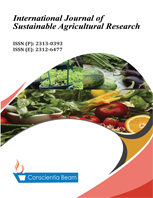A Multi-Criteria Decision Analysis of Wheat Production Sustainability in the Semi-Arid Environment of Mashhad, Northeastern Iran
DOI:
https://doi.org/10.18488/journal.70.2021.81.1.16Abstract
Globally, wheat is the most staple food for one-third of the population and provides more daily calories and protein than any other crop. However, its production still poses great social and environmental challenges for humanity. Hence, agricultural sustainability indices are commonly used to evaluate all economic, ecological, and social dimensions of crop production from theory into practice around the world. This assessed agricultural sustainability of irrigated (IWPS) and rainfed (RWPS) wheat production systems in the semi-arid environment of Mashhad (northeastern Iran). Data were obtained from irrigated and rainfed wheat farms in Mashhad for the growing seasons (Oct-May) during 2006-2010. The questionnaire was also designed to collect data from the farmers. A multi-criteria decision analysis (MCDA) was performed to identify the most significant economic, ecological, and social criteria influencing the agricultural sustainability index. The results determined that IWPS is more sustainable than RWPS in Mashhad as the economic viability for IWPS is relatively higher than that for RWPS. However, RWPS has also a high potential to achieve agricultural sustainability in environments without water stress. Finally, face-to-face interviews confirmed that farmers do not invest heavily in RWPS because of its high sensitivity to precipitation, temperature, and soil quality in Mashhad (northeastern Iran).

